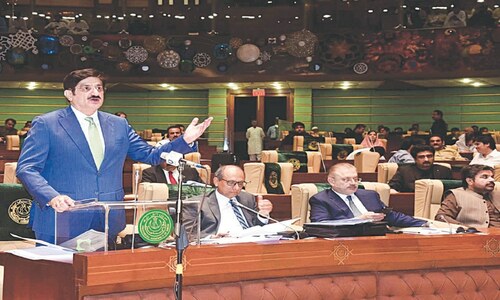KARACHI, April 24: The city government, a private medical university and the World Health Organization (WHO) agreed on Saturday to initial a Memorandum of Understanding (MoU) under which a joint programme will be launched to combat various diseases , including malaria, afflicting the Karachiites.
Suggestion for the MoU came from the Nazim of Karachi at a seminar on blood transfusion and malaria, which was organized by the Ziauddin Medical University (ZMU). The proposal was readily accepted by the chancellor of the university, Dr Asim Hussain.
After the seminar, Dr G.N. Kazi of the WHO, who was one of the participants, told Dawn that the international agency welcomed the move. "It's our policy to encourage partnerships between the public and private institutions," he explained.
"That's why, the WHO will be very much on board so far as this new initiative is concerned."
Speaking to this reporter, both the chancellor and vice-chancellor of the university said that in the first week of next month the Nazim, officials from the ZMU and the WHO representatives would hold a meeting to thrash out the details of the initiative.
Speaking at the seminar, meanwhile, Naimatullah Khan pointed out that more than 50 per cent of the Karachiites lived in the Katchi Abadis. "These people don't even have access to clean air, let alone clean water."
The people residing in the Katchi Abadis did not afford to buy bed-nets. "Therefore, it's up to the rich and wealthy people of Karachi to help their brothers and sisters living in the slum areas."
The Nazim was of the opinion that the people who had made it good in the city should pay back what they owed to it. He urged the corporate citizens of the city to come forward and work for the betterment of Karachi.
Dr Altaf Ahmad of the Liaquat National Hospital maintained that the city government officials need not look further than the Aziz Bhatti Park if they wanted to find out where the biggest breeding ground for mosquitoes was.
In his hard-hitting presentation, he bemoaned the fact that all the stakeholders, including the authorities, claimed that they needed help. In such a situation, no one was there to take care of the common people.
Underscoring the need for the right kind of approaches for the diagnosis of malaria cases, Dr Ahmad observed that the thick-blood technique was far more accurate than the thin-film technique of making slides.
Every technician should spend between 20 and 30 minutes on each slide. If this was not done, right kind of diagnosis could not be made. He revealed that many technicians working in his laboratory worked as pathologists elsewhere in the city.
Dr Michelle Karim of the ZMU said there was no part of the city which could be described as a low-risk area. The influx of refugees had compounded the problem over the years.
Mir Hussein Ali, the DCO of Karachi, enumerated the factors that were responsible for the increasing prevalence of malaria in the city. The number of Katchi Abadis stood at 538 in 1985. "Today, however, the number may be upwards of 1,000."
Despite the passage of more than 55 years since independence, the city was yet to have a solid waste management system. And the channels that were meant to drain rainwater during the monsoon had turned into open sewers.
Dr G.N. Kazi of the WHO said 43 districts had been identified from where between 60 and 70 per cent of the malaria cases were reported. Sixteen of the districts belonged to Sindh.
He informed all those present that a PC-1 worth Rs60 million had been formulated for an initiative to be launched in the 16 districts of the government where malaria was rampant.
Dr Asim Hussain, Prof Masood Hameed Khan and Dr Abbas Zafar also spoke on the occasion.














































Dear visitor, the comments section is undergoing an overhaul and will return soon.